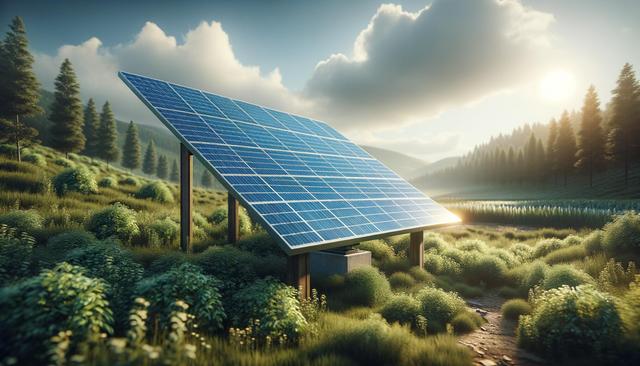What Are Solar Panels and How Do They Work?
Solar panels, also known as photovoltaic (PV) panels, are devices that convert sunlight into electricity. They are composed of many solar cells made from semiconductor materials like silicon. When sunlight hits these cells, it creates an electric current through the photovoltaic effect. This direct current (DC) electricity is then converted into alternating current (AC) by an inverter, making it usable for homes and businesses.
The most common types of solar panels include monocrystalline, polycrystalline, and thin-film. Each type has different characteristics in terms of cost, efficiency, and appearance. While monocrystalline panels are known for their high efficiency and sleek design, polycrystalline panels are often more affordable. Thin-film panels, on the other hand, are lightweight and flexible, making them suitable for unique installation needs.
Key components of a solar power system include:
- Solar panels
- Inverter
- Mounting system
- Battery storage (optional)
- Monitoring system
Understanding how these components work together can help users make informed decisions when considering solar energy for their property.
Benefits of Installing Solar Panels
Installing solar panels offers a range of advantages, both economic and environmental. One of the most immediate benefits is the reduction in electricity bills. By generating your own power, you become less reliant on the grid, which can lead to significant savings over time.
Environmental benefits include:
- Reduction of carbon footprint
- Decreased reliance on fossil fuels
- Support for clean and renewable energy sources
Solar panels also increase property value. Homes equipped with solar energy systems are often more attractive to prospective buyers, as they promise lower utility costs and a sustainable lifestyle. Additionally, many countries and regions offer tax incentives, rebates, and grants to encourage the adoption of solar technology, making the initial investment more accessible.
By choosing solar energy, individuals contribute to a more sustainable future while also enjoying long-term financial benefits.
Factors to Consider Before Installation
Before installing solar panels, several factors should be examined to ensure the system’s effectiveness and efficiency. First and foremost is the location. Solar panels require direct sunlight to operate efficiently. Therefore, regions with high solar irradiance yield better results. Roof orientation and angle also play a crucial role; south-facing roofs with minimal shading are ideal.
Other considerations include:
- Roof condition and available space
- Local weather patterns
- Energy consumption habits
- Budget and financing options
It’s also essential to check local regulations and obtain any required permits. Working with a certified installer can simplify this process and ensure compliance with building codes and safety standards. Proper planning and evaluation help maximize the return on investment and avoid potential issues after installation.
Maintenance and Lifespan of Solar Panels
One of the appealing features of solar panels is their low maintenance requirement. Most systems are designed to operate efficiently with minimal upkeep. However, occasional cleaning and inspections can help maintain optimal performance. Dust, debris, and bird droppings can accumulate on panels and reduce their efficiency.
General maintenance tips include:
- Cleaning panels with water and a soft brush
- Monitoring system performance regularly
- Scheduling professional inspections annually
The average lifespan of solar panels ranges from 25 to 30 years. During this time, their efficiency may gradually decline, but they can still produce a significant amount of energy. Inverters typically last between 10 to 15 years and may require replacement during the panel’s lifetime. Battery storage systems, if used, also have their own maintenance and replacement schedules.
Regular maintenance ensures consistent energy production and prolongs the system’s operational life, making solar energy a reliable long-term solution.
Financial Considerations and Return on Investment
While the initial cost of installing solar panels can be substantial, the long-term savings often outweigh the upfront expense. The return on investment (ROI) depends on several factors, including system size, local electricity rates, and available incentives.
Financial benefits may include:
- Lower monthly utility bills
- Tax credits and rebates
- Net metering programs that credit excess energy sent to the grid
Many financing options are available to offset the initial cost, such as solar loans, leases, and power purchase agreements (PPAs). Each option has its own terms and implications, so it’s important to evaluate them carefully and choose one that aligns with your financial goals.
Over time, solar panels can provide substantial savings and may even generate income through energy credits. Calculating the payback period helps determine how quickly the investment will be recouped, which typically ranges from 5 to 10 years depending on usage and location.
Conclusion: Is Solar Energy Right for You?
Adopting solar energy is a meaningful step toward reducing environmental impact and gaining energy independence. Whether for a residential home or a commercial property, solar panels offer a practical and sustainable energy solution with long-term benefits. By understanding how solar systems work, evaluating site-specific factors, and considering financial implications, individuals can make informed decisions that align with their values and needs. Investing in solar energy not only supports a cleaner planet but also empowers users to take control of their energy future.







